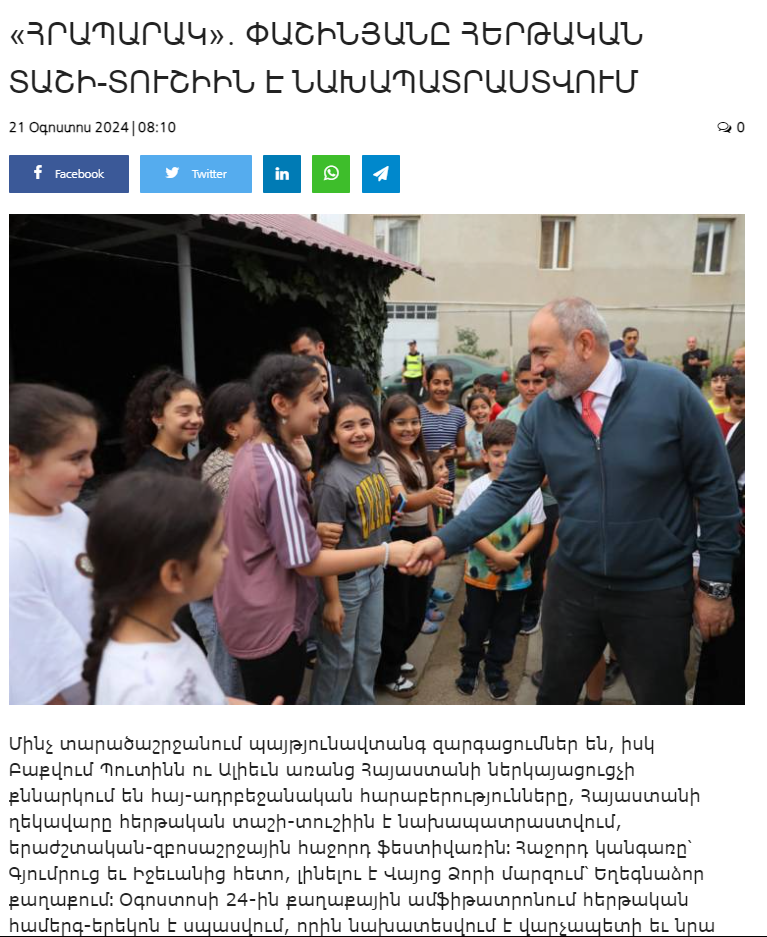|
|
TODAY.AZ / World news
Pashinyan's spending more time in entertainment than in politics causes public concern
21 August 2024 [20:15] - TODAY.AZ
 Fatima Latifova
Fatima Latifova
Recently, Armenian media have reported that Nikol Pashinyan is not interested in state affairs. Complaints about the Prime Minister's neglect are increasing. Particularly, amidst Vladimir Putin's visit to Baku and discussions with the Azerbaijani President about the peace process, Pashinyan spending his days at concerts is causing Armenia to be sidelined in these crucial discussions. This is further diminishing Yerevan's role in regional political processes and weakening Armenia's influence in its foreign policy.

It is important to note that there is significant domestic dissent and bias against the Prime Minister. Pashinyan's apparent focus on a major music festival rather than addressing social and political issues within the country is fueling criticism against him in Armenia. This indifference reinforces the perception that he is not paying enough attention to state matters and is neglecting the country’s strategic interests. Pashinyan’s failure to take steps related to the peace process, and the inability to manage inconsistencies and crises in Armenia’s policies, can be attributed to two possible reasons:
Possibility 1: Nikol Pashinyan Relies on Certain Allies
This indifference and cool demeanor reveal Pashinyan’s approach to both domestic and foreign issues. His current ease and confidence might indicate that he is blindly relying on some external forces, despite growing discontent and social issues within the country. This possibility is considered the most reliable version for Armenia's future. If Armenia’s Prime Minister chooses to focus on concert programs rather than state affairs while relying on his patrons, it could mean selling out the country. In summary, Nikol Pashinyan appears to be distancing himself from politics and enjoying a comfortable life while outsourcing Armenia's internal and external issues to foreign elements.
Possibility 2: The Prime Minister is Leading Armenia to the Abyss
Pashinyan’s previous active participation in the peace process, contrasted with his current lack of discussion on the matter, could be related to personal problems. His unilateral approach to regional politics, driven by minimal external assistance and dragging the Armenian people along a path with an uncertain end, could endanger the country’s future.
It is likely that Armenia’s current refusal to participate in the peace process stems from a desire to adopt an "independent" diplomatic stance. This approach aims to alter the balance of power in the region and protect Armenia’s interests. However, the Prime Minister must understand that such steps could lead to more significant strategic impacts and consequences. Historically, Armenia has always hidden under the protection of other countries and survived thanks to its patrons. While Russia was once the protector, now it is clearly Western elements. Although Pashinyan’s administration advocates "freedom" ideas by worsening relations with Russia, choosing Western countries as protectors instead means imposing new chains of subjugation on itself. However, recent events in the regions close to the South Caucasus demonstrate that relying on the West can ultimately lead to disaster.
It is currently difficult to predict what policy Pashinyan will pursue in the region. Nevertheless, his indifference to regional events, delays in peace talks with Azerbaijan, and spending his days on concert programs instead of addressing crucial matters are lamentable for the Armenian people. The governance of a country should be in the hands of those who serve the well-being of the people and the country’s geography. Unfortunately, Armenian leadership either continues to delegate the country’s affairs to foreign elements or genuinely shows no concern for Yerevan’s future.
URL: http://www.today.az/news/regions/251979.html
 Print version
Print version
Connect with us. Get latest news and updates.
See Also
- 16 November 2024 [08:00]
US and Britain extended treaty on use of atomic energy for defense purposes - 15 November 2024 [23:30]
United States deploys naval reconnaissance aircraft in Scotland - 15 November 2024 [22:27]
Schumacher's latest car is up for auction - 15 November 2024 [21:46]
Tbilisi City Hall allocated 8.6 million lari for New Year's events - 15 November 2024 [20:48]
Iran prepares to treat women who violate hijab law - 14 November 2024 [23:45]
Minister Bayraktar emphasizes Turkiye's role in net zero emissions - 14 November 2024 [23:26]
Poland deployed South Korean K2 tanks near border with Russia - 14 November 2024 [22:50]
Pentagon spent $1 billion on the US military industry - 14 November 2024 [21:40]
US budget deficit quadrupled in year - 14 November 2024 [20:19]
Impressive warehouse discovered in Turkiye
Most Popular
 Provocateur Le Pen go to jail
Provocateur Le Pen go to jail
 Azerbaijan's Leadership at COP29: Addressing Global Climate Challenges and Exposing Hypocrisy
Azerbaijan's Leadership at COP29: Addressing Global Climate Challenges and Exposing Hypocrisy
 Macron Stung by President Ilham Aliyev's Truth: French Minister Ordered to Skip Baku Visit
Macron Stung by President Ilham Aliyev's Truth: French Minister Ordered to Skip Baku Visit
 Who uses Greta Thunberg and how?
Who uses Greta Thunberg and how?
 Climate Platform for business, investment & philanthropy launched within COP29
Climate Platform for business, investment & philanthropy launched within COP29
 United States announced plans to deepen security cooperation with Indonesia
United States announced plans to deepen security cooperation with Indonesia
 Azerbaijan’s COP29 presidency sets precedent with focus on amplifying voices of vulnerable nations
Azerbaijan’s COP29 presidency sets precedent with focus on amplifying voices of vulnerable nations
